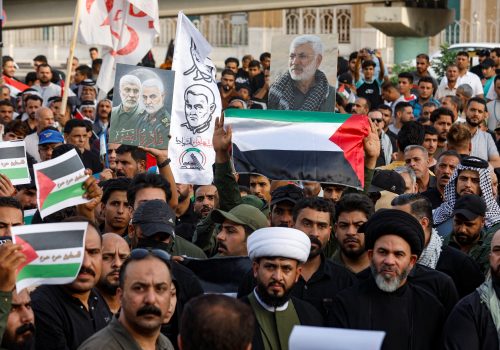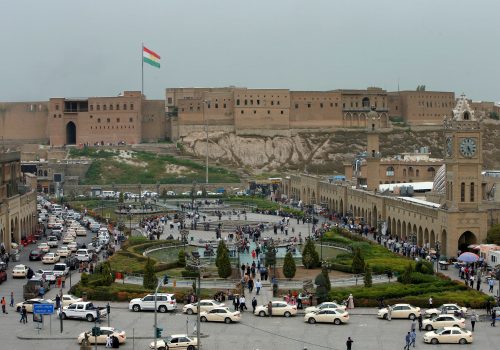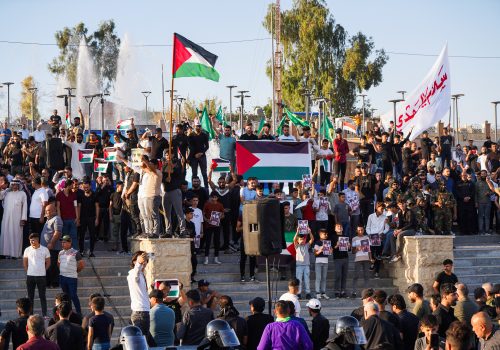Iraq’s parliamentary speaker was removed. What’s next for the country?
The Iraqi Supreme Court set a new precedent by revoking the membership of Mohamed al-Halbousi in the Council of Representatives (CoR) on November 14. The consequential incident—prompted by allegations of forgery, abuse of power, and violating his oath of office—ended his role as the president of Iraq’s legislature. This is a very significant verdict for Halbousi, who will not be able to hold any public office or any government position as long as this verdict stands. It also bears significant consequences for the fragile Iraqi political process, which sits on a delicate ethno-sectarian balance.
Removing Halbousi from the highest office the Sunni minority holds brings back old accusations of marginalizing the second-largest segment of the Iraqi population. This charge is made every time a minority politician is removed from office, even when his or her wrongdoing is evident and proven beyond any reasonable doubt in a court of law. Claims of marginalization have often assisted these politicians, as well as other leaders who oppose the Iraqi political system, in their effort to fan the flames of ethno-sectarian grievances. This has led to violence and instability, ultimately providing a suitable environment for insurgency and terrorism. Halbousi reminded his opponents of this risk in his reaction to the verdict, referring to “some who are working towards destabilizing [Iraq].”
Speaker Halbousi was elected to the Council of Representatives as a representative of Western Anbar province in 2014, resigning from the position to serve as governor of Anbar in 2017. He then won a seat in the 2018 parliamentary election and was elected fourth president of the Iraqi CoR. In 2022, he became the first representative to be elected twice for the CoR presidency.
In Iraqi politics, Halbousi embodied a new generation of Sunni leadership that took a realist approach to Iraqi politics. This departure from the confrontational style of past leaders aimed to avoid the recurring conflicts and painful consequences that have plagued the Sunni-majority provinces: the 2003 insurgency; the catastrophic Islamic State of Iraq and al-Sham (ISIS) invasion in 2014; and the subsequent war to liberate Iraq ending in 2017. Halbousi and the political bloc he founded, Taqaddum, focused on national inter-sectarian cooperation, local reconstruction, and services.
The current crisis dates back to May 2022, when Halbousi removed one of his bloc’s members, Laith al-Dulaimi, from the CoR membership, claiming that Dulaimi submitted his resignation from the parliament. Dulaimi denied the claim and took his case to the Iraqi Supreme Court, accusing Halbousi of forgery and abuse of power. He claimed that Halbousi forced him and other members from his bloc to sign undated resignations during the previous parliamentary term to ensure their future cooperation. Dulaimi was restored to his CoR position after he reconciled his differences with Halbousi, but the latter revoked Dulaimi’s membership for the second time in January.
Citing several legal violations by Halbousi, the November 14 Supreme Court decision revoked both Dulaimi’s and Halbousi’s membership. The latter presided in the CoR session immediately after the announcement of his removal and stated from the speaker seat that “there are people who seek to shake the stability in the country and the fragmentation of its political and social components.” He proceeded to characterize the court’s verdict as “strange.” Addressing his colleagues and the Iraqi audience, Halbousi emphasized that he and his party “came from a community that opposed the political process until 2014. This multifaceted opposition contributed to the fall of one-third of Iraqi territory” to the hands of ISIS.
Halbousi also revealed his intention to take constitutional measures to confront the verdict, which he attributed to external pressure on the court. In his November 15 press conference, Halbousi rejected the Supreme Court decision, arguing that the Iraqi Constitution grants the court the authority to adjudicate the accusations against the president of the republic, the prime minister, and ministers, but not the authority to look into the accusations against the president of the CoR nor its members, nor the authority to remove them from the office they hold. Halbousi did not comment on the allegations against him and did not deny any wrongdoing.
The consequences of this decision, which is mandatory and not subject to appeal, are not yet apparent. However, what has happened is the resignation of three ministers who had won their cabinet seats with Halbousi’s support: the Minister of Culture, Tourism and Antiquities, Ahmed Fakak Al-Badrani; Minister of Planning, Muhammad Tamim; and Industry Minister, Khaled Battal (the minister of planning also holds a position of deputy prime minister).
In the CoR, Halbousi’s Taqaddum bloc has declared their intention to resign from committee chairmanship and abstain from parliamentary sessions. However, if widespread resignation of Halbousi’s political bloc in the parliament occurs, it would mark the second-largest intra-sectarian shift in political balance since the mass resignation of the Sadrist bloc in June 2022, which caused intra-Shia political upheaval. The Sadrists and Taqaddum emerged as the primary winners of their respective sectarian constituencies in the 2021 elections.
The timing of this development is particularly crucial, given that Iraq, like the rest of the region, is entangled in the escalating Israel-Hamas war. Additionally, the country is in the midst of an election campaign to reinstate provincial councils. These councils disbanded in 2019 following the parliament’s vote to terminate their operations due to Iraq’s inability to hold comprehensive provincial elections amid the war on ISIS.
An important development to watch for is the position of Halbousi’s Sunni allies in the Azm bloc, led by Khamis al-Khanjar, who is leading the collective Sunni coalition that includes Azm and Taqaddum. If they imitate Shia cleric Muqtada al-Sadr’s Shia rivals and move to fill the positions vacated by Taqaddum, a similar intra-sectarian fragmentation to the intra-Shia and intra-Kurdish fragmentations will be seen among the Sunnis. This scenario will lead to bitterly fought provincial elections across Iraq—not to mention its menacing consequences to the government of Prime Minister Mohammed Shia al-Sudani, who has refrained from commenting on the removal of Halbousi thus far.
Sudani’s government promised to prepare for an early national election within one year of his term, which began on October 27, 2022, to mitigate the fallout of Sadrist mass resignations from parliament. However, relative political stability and the acquiescence of Sadr to the continuation of the current government have encouraged the Sudani government to carry on for the time being and hold a provincial election instead. Nonetheless, justifying the continuation of governance becomes challenging when considering the absence of key representation from the largest Shia and Sunni winners in the 2021 general elections.
Dr. Abbas Kadhim is director of the Atlantic Council’s Iraq Initiative. Follow him on X: @DrAbbasKadhim.
Further reading
Fri, Oct 20, 2023
The conflict in Gaza threatens Iraq’s stability, progress in US-Iraq relations
MENASource By C. Anthony Pfaff
After Israel responded to Hamas’s deadly October 7 attacks, Iraqis took to the streets in massive pro-Palestinian protests, burning Israeli flags and chanting anti-American slogans.
Thu, Aug 17, 2023
The path to transforming Iraqi Kurdistan’s economic diversity and potential
MENASource By
The self-sufficiency and sustainability of a government are contingent on a strong economy, and this is the path the Kurdistan Region of Iraq has taken.
Tue, Nov 7, 2023
Iraq is at a crossroads. Will it choose its Shia militias or relations with the US?
MENASource By Sarkawt Shamsulddin
Iraq is facing a high-stakes balancing act that carries profound implications for its relations with the United States and regional stability.
Image: FILE PHOTO: Iraqi speaker of Parliament Mohammed al-Halbousi appears during a vote in Sudani's cabinet at the parliament in Baghdad, Iraq, October 27, 2022. Iraqi Parliament Media Office/Handout via REUTERS


